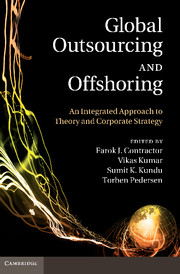Book contents
- Frontmatter
- Contents
- List of figures
- List of tables
- List of boxes
- Notes on contributors
- Preface: the reconfiguration of the world economy
- Part I Conceptual frameworks and theories
- Part II The offshoring and outsourcing of R&D and innovative activities
- 4 Blurring firm R&D boundaries
- 5 Outsourcing, fragmentation, and integration
- 6 Towards a better understanding of multinational enterprises' R&D location choices
- 7 Does R&D offshoring displace or strengthen knowledge production at home? Evidence from OECD countries
- 8 Innovation across tech-firms' boundaries
- 9 Suitable organization forms for knowledge management at various R&D functions in decentralized and cooperative R&D networks
- Part III Management issues in offshoring and virtual teamwork
- Part IV Empirical analyses and case studies of outsourcing and offshoring
- Index
- References
5 - Outsourcing, fragmentation, and integration
The pharmaceutical industry
Published online by Cambridge University Press: 10 January 2011
- Frontmatter
- Contents
- List of figures
- List of tables
- List of boxes
- Notes on contributors
- Preface: the reconfiguration of the world economy
- Part I Conceptual frameworks and theories
- Part II The offshoring and outsourcing of R&D and innovative activities
- 4 Blurring firm R&D boundaries
- 5 Outsourcing, fragmentation, and integration
- 6 Towards a better understanding of multinational enterprises' R&D location choices
- 7 Does R&D offshoring displace or strengthen knowledge production at home? Evidence from OECD countries
- 8 Innovation across tech-firms' boundaries
- 9 Suitable organization forms for knowledge management at various R&D functions in decentralized and cooperative R&D networks
- Part III Management issues in offshoring and virtual teamwork
- Part IV Empirical analyses and case studies of outsourcing and offshoring
- Index
- References
Summary
Introduction
The outsourcing of non-core standardized tasks and processes which permit relatively easy measurement of performance and quality is a well-known story. Outsourcing is presented as an opportunity resulting from technological changes that permit the springing up of thick intermediate markets (Langlois, 2003; Milberg, 2004; Narula, 2001; Williamson, 1981). This allows firms to use markets to obtain intermediate products and services, with the associated benefits from specialization, economies of scale, and competition, resulting in lower costs and better quality intermediate products (Langlois, 2003). This is treated as a dynamic transaction cost story. Advances in the standardization and codification of production processes promotes a smooth interface between vertical stages of production. This allows principal firms to concentrate on core competence activities, with few coordination costs required to maintain the vertical relationship. Coordination costs are low because the outsourced intermediate product is the result of rote labor which can be easily measured and monitored by the new technology embodied in production equipment. In addition, the principal firm benefits from conservation of capital, diminishing uncertainty, and the spreading of risk. In this story, the principal firm retains knowledge-process core competences within the firm, not only because these competences rely on tacit information and ongoing knowledge creation (and are thus difficult to transfer to an outside entity), but also because they are the sources of the firm's competitive advantages, requiring protection from appropriation (Dosi et al., 2006; Kogut and Zander, 1993; Sen, 2006). Langlois (2003: 347) describes the pre-conditions for this organizational transformation:
Decentralization implies an ability to cut apart the stages of production cleanly enough that they can be placed into separate hands without high costs of coordination…decentralization implies some degree of standardization of “interfaces” between stages.
Information
- Type
- Chapter
- Information
- Global Outsourcing and OffshoringAn Integrated Approach to Theory and Corporate Strategy, pp. 137 - 167Publisher: Cambridge University PressPrint publication year: 2010
References
Accessibility standard: Unknown
- 1
- Cited by
